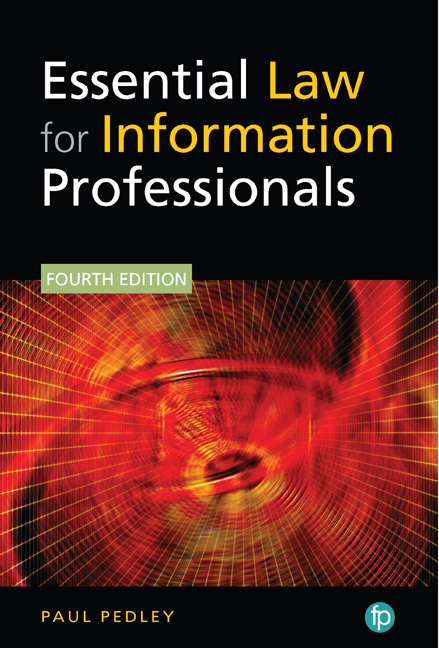Book contents
- Frontmatter
- Dedication
- Contents
- Disclaimer
- List of Figures and Tables
- Table of Statutes, Etc.
- Table of Cases
- Abbreviations
- Glossary of Terms
- Preface
- Chapter 1 General law and background
- Chapter 2 Library Law
- Chapter 3 Copyright
- Chapter 4 Legal Deposit
- Chapter 5 Breach of Confidence
- Chapter 6 Contracts and Licensing Agreements
- Chapter 7 Data Protection
- Chapter 8 Privacy
- Chapter 9 Freedom of Information
- Chapter 10 Human Rights
- Chapter 11 Re-use of Public Sector Information
- Chapter 12 Defamation
- Chapter 13 Professional Liability
- Chapter 14 Cybersecurity and Cybercrime
- Chapter 15 Disability Discrimination
- Chapter 16 Other Legal Issues Relevant to Librarians
- References
- Appendix 1 Brexit and the Orphan Works Exception
- Appendix 2 CILIP'S Ethical Framework
- Index
Appendix 1 - Brexit and the Orphan Works Exception
Published online by Cambridge University Press: 27 March 2020
- Frontmatter
- Dedication
- Contents
- Disclaimer
- List of Figures and Tables
- Table of Statutes, Etc.
- Table of Cases
- Abbreviations
- Glossary of Terms
- Preface
- Chapter 1 General law and background
- Chapter 2 Library Law
- Chapter 3 Copyright
- Chapter 4 Legal Deposit
- Chapter 5 Breach of Confidence
- Chapter 6 Contracts and Licensing Agreements
- Chapter 7 Data Protection
- Chapter 8 Privacy
- Chapter 9 Freedom of Information
- Chapter 10 Human Rights
- Chapter 11 Re-use of Public Sector Information
- Chapter 12 Defamation
- Chapter 13 Professional Liability
- Chapter 14 Cybersecurity and Cybercrime
- Chapter 15 Disability Discrimination
- Chapter 16 Other Legal Issues Relevant to Librarians
- References
- Appendix 1 Brexit and the Orphan Works Exception
- Appendix 2 CILIP'S Ethical Framework
- Index
Summary
Brexit and the orphan works exception
In the event of the UK leaving the European Union, it is anticipated that the orphan works exception will no longer be available.
At the time of writing, the UK had not left the European Union on 29 March 2019 as originally anticipated and the Brexit negotiations were still ongoing. As a result, the text relating to the orphan works exception has been moved to this Appendix, in case the outcome of the UK's Brexit negotiations leads to the exception still being available.
The copyright exception for orphan works
The EU Directive on orphan works 2012/28/EU is implemented in the UK through The Copyright and Rights in Performances (Certain Permitted Uses of Orphan Works) Regulations 2014 (SI 2014/2861). It inserts section 44B on ‘Permitted uses of orphan works’ into the CDPA 1988. Directive 2012/28/EU allows digitisation of orphan works by certain cultural organisations. However:
• It only covers non-commercial use.
• It doesn't cover standalone artistic works such as photographs, maps or plans.
• There is no requirement to set aside money for absent rights holders.
• If the rights owners do reappear, fair compensation should be paid.
• It requires a diligent search to be undertaken. The searcher must search the EUIPO database (https://euipo.europa.eu/ohimportal/en/web/observatory/ orphan-works-db) to see if the work already appears on the database and must provide EUIPO with details of the diligent search for the rights holders which has been undertaken.
• It is possible to appeal to the Copyright Tribunal to determine a compensation amount in the event that the rights owner comes forward but where the relevant body and the rights owner have been unable to agree on a suitable figure.
The exception is only for the benefit of certain types of cultural institution:
• Publicly accessible libraries.
• Educational establishments.
• Museums.
• Archives.
• Film or audio heritage institutions.
• Public service broadcasting organisations.
The institutions covered by the Directive are only permitted to use the orphan works in order to achieve the aims of their public interest missions – notably preservation, restoration and the provision of cultural and educational access to works contained in their collections.
- Type
- Chapter
- Information
- Essential Law for Information Professionals , pp. 337 - 338Publisher: FacetPrint publication year: 2019



